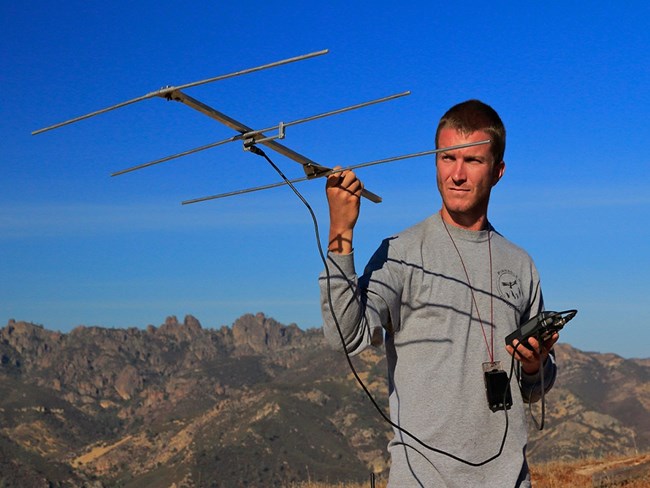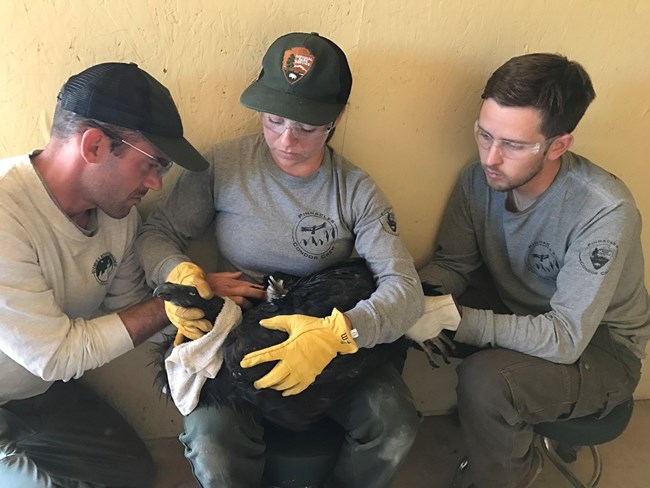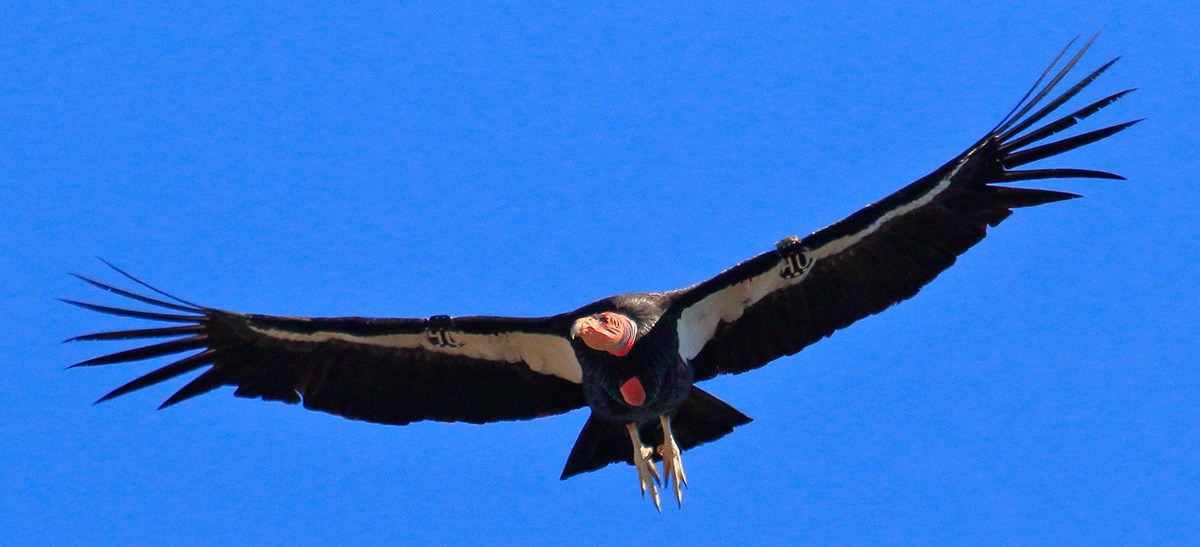
NPS/Gavin Emmons Releasing Captive CondorsPinnacles National Park is the only NPS unit that manages a release site for captive bred California condors. Juvenile condors are transferred to Pinnacles from captive breeding facilities (Los Angeles Zoo, San Diego Zoo Safari Park, Oregon Zoo, and World Center for Birds of Prey) when they are approximately 1.5 years old. They are then placed into a flight pen in a remote area of the park and allowed to acclimate to their new environment for at least 2 months. During this time, park biologists regularly observe the juveniles to ensure they are displaying normal behavior. The young birds are also able to meet the rest of the flock though the flight pen mesh, when the curious wild condors come to check out the "rookies". Before release, the juveniles are outfitted with radio transmitters and vinyl ID tags. Park biologists continue to closely monitor the juveniles’ behavior as they take their first flights in the wild, ensuring they find appropriate roost and feeding sites. NPS/Gavin Emmons TrackingEach Pinnacles condor is outfitted with a visual ID tag and at least one radio transmitter. Some birds are also given GPS transmitters. These allow park biologists to track the movements and behaviors of the flock. Condor staff and volunteers can often be seen tracking along the trails within the park or along the roads in the surrounding areas. 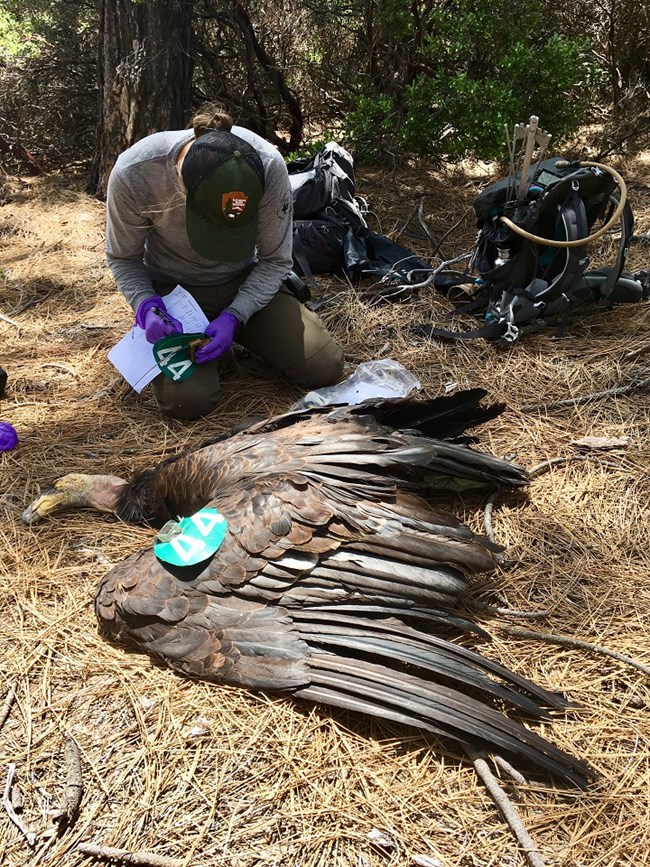
NPS/Rose Fielding Mortality Monitoring and RecoveryA crucial part of any endangered species recovery program is documenting and addressing threats. Through tracking efforts, biologists are able to recover deceased condors from the field and submit them for necropsy and analysis in an attempt to determine the cause of death. Gaining an understanding of threats to the species assists the recovery program in addressing these hazards. In 2012 researchers published a paper (Rideout et al., 2012) examining condor deaths in the wild from 1992-2009. A definitive cause of death was determined on 76 out of 100 condors recovered and the leading cause of death was lead poisoning, representing 30% of known condor mortalities. Efforts to reduce lead exposure in all wildlife have increased due to this understanding. Learn more about how lead can affect condors and other wildlife. Outreach and EducationEducating the public about the plight of endangered species is a critical element to any recovery program. Current threats to condor survival are human induced and can be addressed through education and partnerships. Lead poisoning from ingesting ammunition fragments in carcasses continues to be the number one threat to condor survival. Since 2007, Pinnacles has partnered with the Institute for Wildlife Studies and surrounding communities to promote the use of non-lead ammunition for hunting and ranching operations. In addition, Ventana Wildlife Society has a non-lead ammunition program to assist hunters in accessing alternatives to lead. For more information about non-lead ammunition, visit huntingwithnonlead.org and for more information on wildlife and lead visit our lead information page. 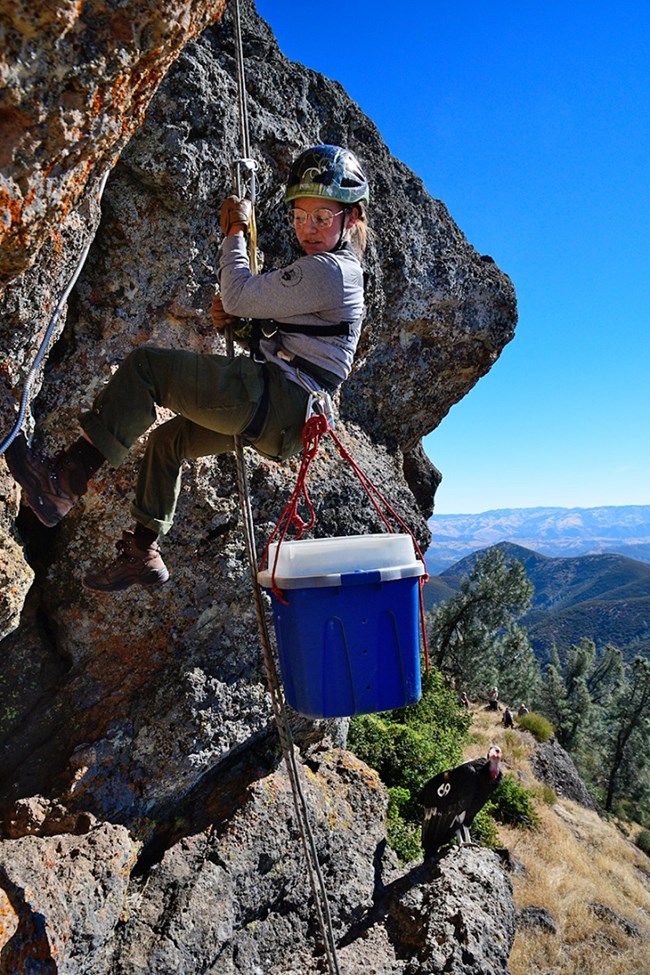
NPS/Gavin Emmons Nest MonitoringBeginning in the late fall, park biologists are busy identifying potential breeding pairs for next spring. Pairs are monitored for breeding displays and are closely observed to determine breeding territories. Once a nest is identified, biologists monitor and enter the nest to conduct health checks on the chick until it is 4 months old, at which point the nestling is outfitted with a radio transmitter and vinyl ID tag. Chicks will remain in the nest for approximately 6 months and will stay in their nesting area for several months after fledging, or flying from the nest. Biologists continue to monitor the nesting area until the fledgling is fully integrated into the flock. TrappingPark biologists, working closely with Ventana Wildlife Society biologists, are specially trained and permitted to participate in biannual trapping of California condors in the spring and fall. During these trapping seasons, malfunctioning transmitters are replaced, measurements and samples are taken for research, and each condor’s blood is tested for lead levels. Blood lead levels are monitored because lead poisoning remains the number one factor in condor mortality. Condors with elevated lead levels are treated at Pinnacles, Los Angeles Zoo, or Oakland Zoo. Learn more about how lead can affect condors and other wildlife. |
Last updated: September 25, 2019

